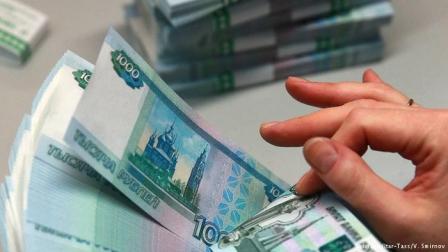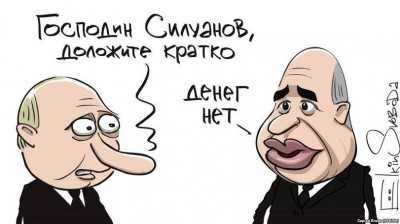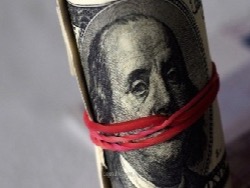Bank deposits in Russia stopped fulfilling the role of not only investment, but also savings tool

To bear money in Bank today becomes almost meaningless: Deposit rates do not cover inflation, and currency risks threaten not to increase but to decrease any savings. In the current economic situation, Bank deposits in Russia has ceased to perform not only the role of investment and savings tool. Despite the widespread idea that money should be kept in the currency in which they are spent, to keep funds on ruble accounts today, not only unprofitable, but also dangerous. In case of a fall of the ruble resulting in the closure of the Deposit amount (including interest) in foreign currency may be much lower than posted, warn experts.
The Russians last year were forced to switched to the so-called savings model of relations with the banking system, specific to the period of declining revenues. In times of crisis, the population tends to spend less and save more, trying to close old debts. As a result the credit market shrinks, and the volume of deposits is growing.
As the Director of the Center for structural research of the Gaidar Institute Mikhail Khromov, last year the share of income allocated to Bank deposits, amounted to 5.7 percent. The Deposit growth rate began to rise again. If in 2014 this figure was negative (deposits then decreased by 4 per cent), while in 2015 it reached 17% (as in 2013).
This year, according to Michael Khromov, due to the recession savings model will continue, although perhaps the rate of growth of deposits will decrease. “This can happen due to the fact that 2016 will be the second year of the crisis, incomes of the population is less and the rate of inflation and the amount of necessary expenses is increasing,” he says.
How adequate the strategy of Bank savings and whether it can in principle be called such, remains a question. As we know, only according to official data of Rosstat, in the past year, inflation reached 12.9% (on a number of food – about 40 percent). The average rate on ruble deposits was about 10 percent. Thus, the real Bank rate was negative.
This year, apparently, the situation will remain the same. At least this forecast was voiced by the Director of Bank Institute of the Higher school of economy Vasily Solodkov. However, for Russia it is not unusual. According to the head of the evaluation Department of the group of companies “FinExpertiza” Alexey Baskakov, “in Russia, the average Deposit rate was almost always below inflation, and the current situation is no exception.” Bank deposits can only minimize the inflationary impact.
Curious emerging changes in the currency preferences of Russians. According to the CBR, as of 1 January 2016 on the deposits of natural persons was 23.2 trillion rubles (16,3 trillion rubles). A year earlier it amounted to 18.5 trillion (a 13.7 – in rubles). That is, the volume of ruble deposits for the year increased by 19 percent (2.6 trillion rubles), while the volume of the currency by 44 percent (2.1 trillion).
It is obvious that in conditions of a sharp devaluation of the national currency credibility is reduced. However, as practice shows, seriously to win by placing funds on foreign currency accounts, will not work.
The analysis (on the basis of the proposals on deposits of the largest banks) showed that, if today set a goal to place 10,000 euros, a typical offer would be a contribution under 1.7 percent per annum. In a year’s time the investor will make a profit of 170 Euro (at today’s exchange rate is 13,6 thousand). If the same funds placed in rubles (approximately 800,000 rubles) under 9.7 percent per annum, for the year you can earn 77000.
So in the categories of today Deposit in rubles is more profitable, because the profit in terms of euros will not amount to 170 euros and 960 euros (the difference is more than 5 times). “But this is assuming that the rate will remain the same. If the Euro will strengthen, you will earn on rouble contributions is not 960 euros and less. Perhaps not enough money, and 170. However, you can also reverse option in which you earn 1.5 thousand Euro. Here you take all the risks,” says Solodkov.
According to the expert, the situation would have been much more profitable for all market players, including the state, if for individuals the system worked hedging (insurance) of foreign exchange risks. “You want to put your money in rubles, but fear exchange rate fluctuations. To protect yourself from them, buy from the Bank an option that will allow you at the expiration of the term of the Deposit to buy the Euro at fixed at the moment of Deposit opening price, for example, 100 rubles per Euro,” explains Solodkov.
If after a year the rouble will strengthen or remain the same, the client will retain the right to take profit in rubles. If will fall sharply, it would be beneficial to buy euros at a predetermined price. “The Bank also wins because he has clients return with history”, – said the expert.
Until such a system in Russia does not work, the expert advises to focus their long term strategies are not for rubles, but in us or European currency: “We often say: you live in Russia, guided by the RUB. But the success of import substitution is highly questionable, the country produces little, and therefore very dependent on the prices at which purchases products, mainly in us dollars or euros. If you look at the Euro zone or the dollar zone and there for 10 years the price has not changed much. If the ruble prices of a decade ago to impose on today’s, the desire to build a long-term strategy in rubles will disappear by itself”. According to Alexey Baskakov, to convert roubles into currency, now is the time, when the ruble strengthened slightly. “Its decline against the dollar up to 10 percent possibly in the second quarter,” he warns.








